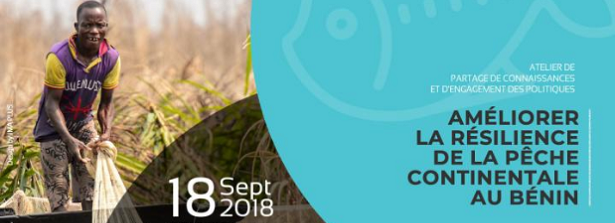
Against the background of the research findings of the Applied Research Fund project “Improving resilience of inland fisher communities in Benin” ACED Benin is organizing a knowledge sharing and policy engagement workshop on September 18, 2018, in Cotonou. Over 100 representatives of government officials, non-state actors, development partners, international organizations, academia and fishermen and fisherwomen associations will participate.
There is a growing recognition, both by the United Nation’s High-Level Panel of Experts on Food Security and Nutrition and a range of recent high impact article from the scientific community, that fish should be put higher on the agenda to curb malnutrition especially in developing countries. In Benin, inland fisheries as opposite to marine fisheries is the most important fish sub-sector in the country providing up to 75% of the national fish production. Fish provides up to 32% of all animal protein in the diet. Yet, the inland fishery sector in Benin is currently experiencing serious problems that undermine its potential to contribute to food and nutrition security. The challenges facing the inland fishery sector are more of human-driven nature. Indeed, the judicious regulations that provided fisher communities to develop shared water resources in a sustainable way are now under a considerable strain due to a mounting population that intensifies uncontrolled fishing techniques (Acadja constructions) enabling overfishing, while pollution from urban areas degrades the quality of the inland water resources.
Over the last three years, with funding from the Netherlands Organisation for Scientific Research (NWO), a research consortium composed of the Centre d’Actions pour l’Environnement et le Développement Durable (ACED), the Laboratory of Hydrobiology and Aquaculture of the University of Abomey-Calavi (LHA) and the Amsterdam Centre for World Food Studies (ACWFS) has conducted extensive research to improve evidence-based policymaking in the fishery sector. The consortium has extensively engaged with fishing communities in Benin having surveyed over 1,000 fishermen and fisherwomen. Among other results, the research revealed that:
- Lake Nokoué and the Porto-Novo lagoon, two of the major inland waters in Benin, are highly polluted. There is a high concentration of heavy metals such as mercury, lead and copper. With the exception of copper, heavy metal levels in both the water and fish flesh are above international standards.
- A substantial part of the fisher community (32 percent) faces food insecurity and limited opportunities to improve their livelihoods by finding other well-paid jobs.
- The shared water resource management is not functioning well. Despite concrete agreements on fishing arrangements, there is a high number of conflicts among fishers. Also, the degree of organization among fishers is low, resulting in a weak negotiation power with both market stakeholders and policymakers.
- Women occupy pivotal positions in the value chain of inland fishery activities; yet the inland fishery sector is still dominated by men, which weakens the position of women, with far-reaching consequences for their economic position, safety and food security.
All the studies conducted during the research project have recommended the development of a well-established platform where fishers can timely express their needs, are actively involved in the formulation of policies and receive regular feedback on the development of the inland fishery sector. It is also recommended that the government releases resources and facilitates this transdisciplinary process by (re)-establishing such a platform and increasingly support the sector through the development of aquaculture, financing of capacity building initiatives, increase of credit access, better organization of fishers’ associations, and gender-sensitive policy making.
Against this background, a workshop for knowledge sharing and policy engagement will be organized on September 18, 2018 at Bénin Royal Hôtel (Cotonou). Over 100 representatives of government officials, non-state actors, development partners, international organizations, academia and fishermen and fisherwomen associations will participate. The workshop is organized to maximize interactions between participants and allow networking, exploration of issues and sharing of knowledge.
This conference is expected to generate the following outcomes:
- Increased understanding of inland fishery vulnerability, resilience and adaptation in Benin;
- Increased understanding of the role of well-functioning shared water resource regulations and proposals to improve them;
- Practical solutions for improving the livelihoods of inland fishers; and
- Enhanced and sustained commitments of various stakeholders to support a multi-stakeholders’ platform for improving the performance of the inland fishery sector and roadmap for its (re)-establishment.
For more information, you can download the concept note and the program of the conference at this link (in French) . You can also participate and contribute to the discussions by following our Facebook page and Twitter account (@acedbenin) with the hashtag #pecheACED18.
- This event has passed.

